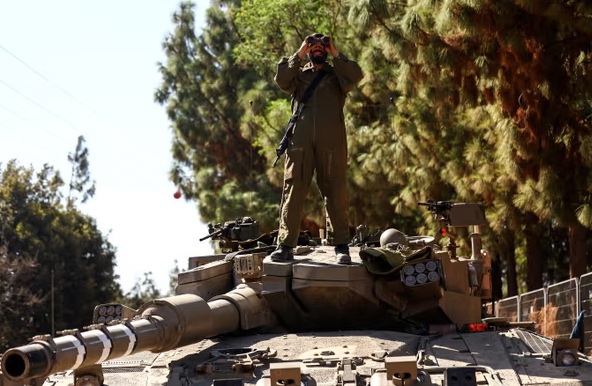The raid was carried out after a UN warning about fuel depletion in the Gaza Strip.
During the night from Thursday to Friday, the Israeli army hit several targets of Gaza militants. Israeli troops and tanks made a brief ground raid into the northern part of the Strip. They plan to “prepare the battlefield” ahead of a widely expected ground invasion after more than two weeks of devastating air raids.
A video of the overnight action released by the Israeli army on Thursday shows armoured vehicles moving through the border area. A bulldozer can be seen levelling part of an elevated bank, tanks firing shells and explosions can be heard nearby or among a number of damaged buildings.
The day before, UN officials announced an imminent shutdown in the territory due to the lack of fuel in the Gaza Strip. The region is under complete blockade by Israel. No water, fuel, electricity or provisions are supplied to Gaza.
The Gaza Strip’s health ministry reports that more than 750 people have died in the past 24 hours, surpassing the previous day’s death toll of 704. By comparison, in 2014, 2,251 Palestinians, mostly civilians, died in the entire six-week war, according to the UN.
Israel accuses Hamas of having its weapons and forces stationed in densely populated areas of Gaza. The Israeli army says it carries out airstrikes strictly on militant targets. The military said it struck militants, militant infrastructure and anti-tank rocket launching positions during the overnight raid. The number of wounded and dead is not yet known.
Meanwhile, an airstrike hit a residential house in the southern town of Khan Younis in the early hours on Thursday. According to family members, 75 people lived in the house, including 25 displaced relatives.
The Gaza Health Ministry has estimated that more than 6,500 Palestinians have been killed because of Israel’s constant shelling. That figure includes the disputed death toll from last week’s hospital bombing. In Israel, the war has killed more than 1,400 people, mostly civilians slain in the first Hamas attack. Hamas also holds some 222 hostages in Gaza. The Israeli government promises to continue the siege of Gaza until all hostages are released.
About 1.4 million of Gaza’s 2.3 million residents have been displaced from their homes. About half of them have been housed in UN shelters. Hundreds of thousands of residents remain in northern Gaza, even though Israel has ordered them to evacuate to the south, saying those who remain could be considered “accomplices” of Hamas. The people of Gaza also face shortages of food, water and medicine. Israel continues to ban fuel needed to run generators, believing Hamas will use it to continue the war.
In recent days, Israel has allowed more than 60 trucks with humanitarian aid from Egypt to pass through. However, aid workers believe this amount is not enough and is only a fraction of what was delivered before the war. A spokesman for the International Committee of the Red Cross said it hopes to deliver about half a dozen trucks of life-saving medical supplies. William Schomburg, head of the sub-delegation in Gaza, said:
“This is a small amount of what is required, a drop in the ocean if you will, given the severity of the consequences of the violence in the last two and a half weeks. Today, we are looking at eight to 10 trucks coming in. We have more that are lined up. We are trying to establish a pipeline.”
UNRWA is sharing its fuel reserves to provide the minimum possible life support to the region. Without fuel, trucks will not be able to distribute aid, bakeries will not be able to feed people in shelters, water will not be desalinated and incubators, life-support machines and other life-saving equipment in hospitals will not work.
If nothing changes by Thursday, fuel supplies will run out. The agency is therefore addressing the issue of rationing its supply, UNRWA spokeswoman Tamara Alrifai told The Associated Press. She noted:
“Do we give for the incubators or the bakeries? It is an excruciating decision.”
The conflict also threatens to spread across the region. On Wednesday, the Israeli military said it struck military facilities in Syria in response to rocket launches from the country. Syrian state media reported that eight soldiers were killed and seven wounded.
Israel has been engaged in almost daily firefights with Iran-backed Hezbollah on the Lebanese border. Syria’s Aleppo and Damascus airports have been targeted by Israeli strikes in an attempt to prevent arms shipments from Iran to militant groups, including Lebanon’s Hezbollah.
Hamas‘s surprise attack on 7 October in southern Israel stunned the country with its brutality, unprecedented death toll and the fact that intelligence agencies were unaware of its approach.
Earlier this week, US media reported that US President Joe Biden’s government was pressuring Israel to delay a ground invasion in the hope of negotiating the release of two US and Israeli citizens taken hostage by Hamas.
